March 28, 2024
Student well-being at forefront of Personal Counseling Center
By Michael Hagan ’15, ’19G
Providence College’s commitment to the well-being of every student — mind, body, and soul — is evident in its investment in the Personal Counseling Center, which reopened in August 2022 in the lower level of Bedford Hall with 16 full- and part-time licensed counselors and advanced trainers.
The on-campus mental health clinic offers students confidential, professional assistance from licensed providers. Psychologists, clinical social workers, and mental health counselors — with specialists in substance use and addiction treatment, student-athlete mental health, and diversity-related concerns — provide 45-minute psychotherapy sessions on a regular or as-needed basis to students with or without a diagnosed mental health issue.
Because the center operates outside the health insurance system, there is no additional cost to students or their families, and no cap on the number of visits. A consulting psychiatrist is available multiple days a week to manage medication to complement therapy.
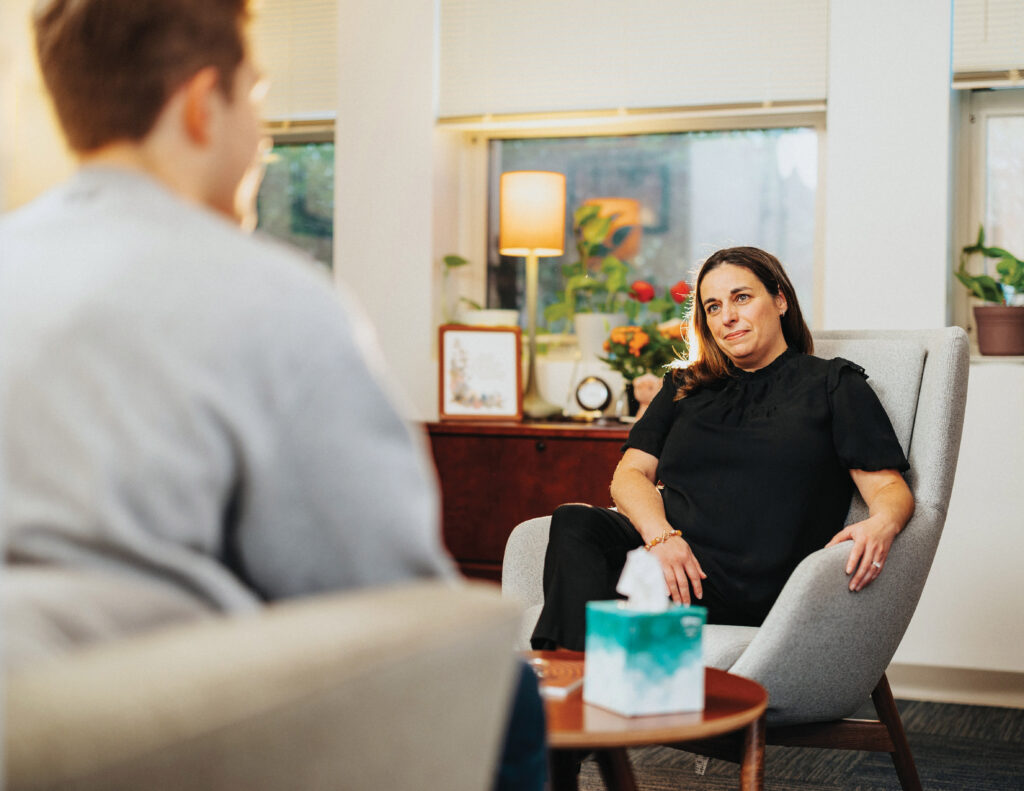
Rosemary Fernandes Mugan, Psy.D. ’98, the center’s executive director, said about 20% of the student body is served by the Personal Counseling Center in a given academic year, up from about 9% when she began working at the college almost two decades ago. The increase is due in part to the decrease in stigma associated with seeking help and aligns with national trends. The American Psychiatric Association said the rate of reported mental health challenges among college students increased by nearly 50% in the last decade.
Discussions about mental health services are now part of the college search process. Families of high school students receiving treatment at home want to know that they can continue while at college. Services for the college-age population are also vital because 50% of mental health conditions begin by age 14 and 75% by age 24, although they may not be diagnosed until years later, according to the National Alliance on Mental Illness.
Any student can make an appointment at the Personal Counseling Center, and anyone at the college with concerns about a student can notify the CARE team — the Campus Assessment Response and Evaluation team — which includes representatives from the Personal Counseling Center, Office of Community Standards, Dean of Students, Chaplain’s Office, Office of Public Safety, Student Health Center, and Student Success Center. The message “You’re Never Alone in Friartown,” which was first introduced by PC Athletics, has been embraced by the entire college community.
Until its expansion following the COVID-19 pandemic, the Personal Counseling Center shared space with the Student Health Center, now located in Davis Hall. (Alumni of certain years recall being directed to lower Bedford Hall with the instruction, “If it’s your body that hurts, go right. Your mind, left.”) The clinical suite is comfortable and welcoming, with a waiting room, private offices and consultation rooms, and a large common room for group sessions and staff meetings.
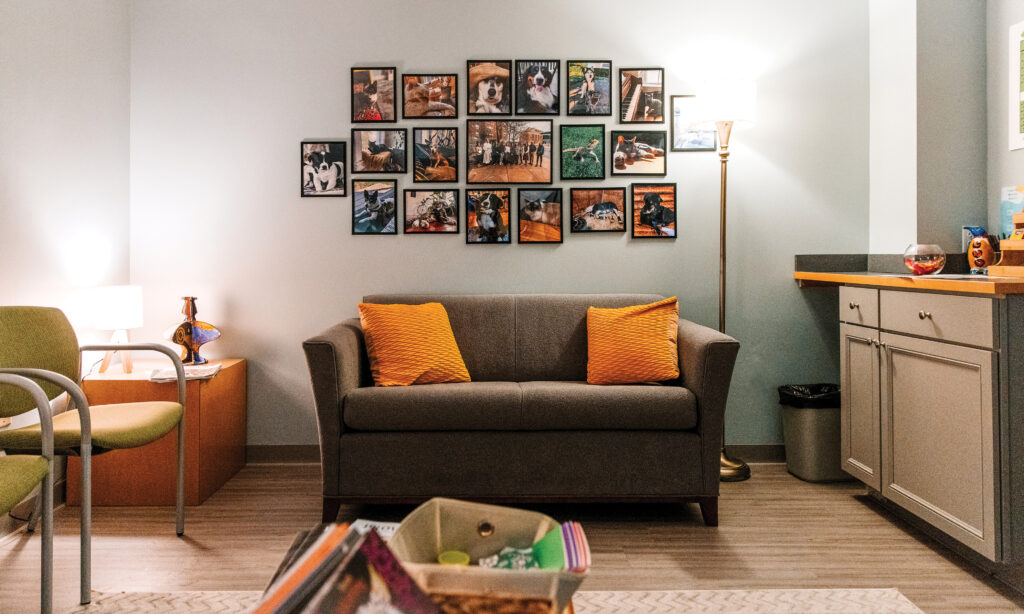
Students are greeted with a display of informational literature about mood disorders, eating disorders, relationships, substance use, gender and sexuality, sleep habits, and more. The waiting area features a photo collage of the staff’s dogs, cats, and other pets (Mugan and her family’s Bernese mountain dog, Finnegan, are training to be a pet therapy team) and there are relaxation items such as mindful coloring pages, activity sheets, and Play-Doh.
Students report feeling relieved or uplifted after even just one session, which has much to do with the posture of openness and non-judgment with which counselors receive them. While a first session is principally an exercise in triage, the cathartic feeling students report speaks to the power of listening. It is the beginning of a process of healing and growth, and the majority return for future appointments.
After the initial visit, each student is matched with a counselor based on personal needs and preferences, and meets consistently with the same person, developing trust and rapport.
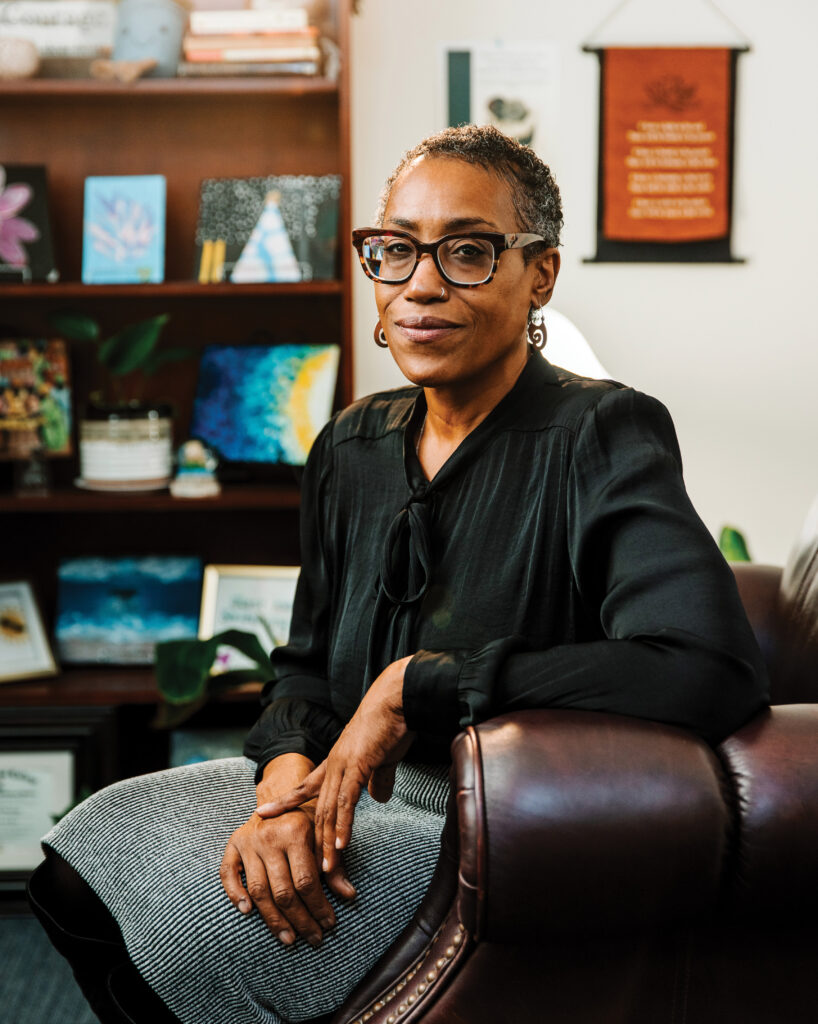
‘Micki’ Johnson Searight, LICSW ’93
Clinical Counselor
She is trained in Accelerated Experiential Dynamic Psychotherapy, is a student of Buddhism, enjoys painting, and has been successful in selling her art.
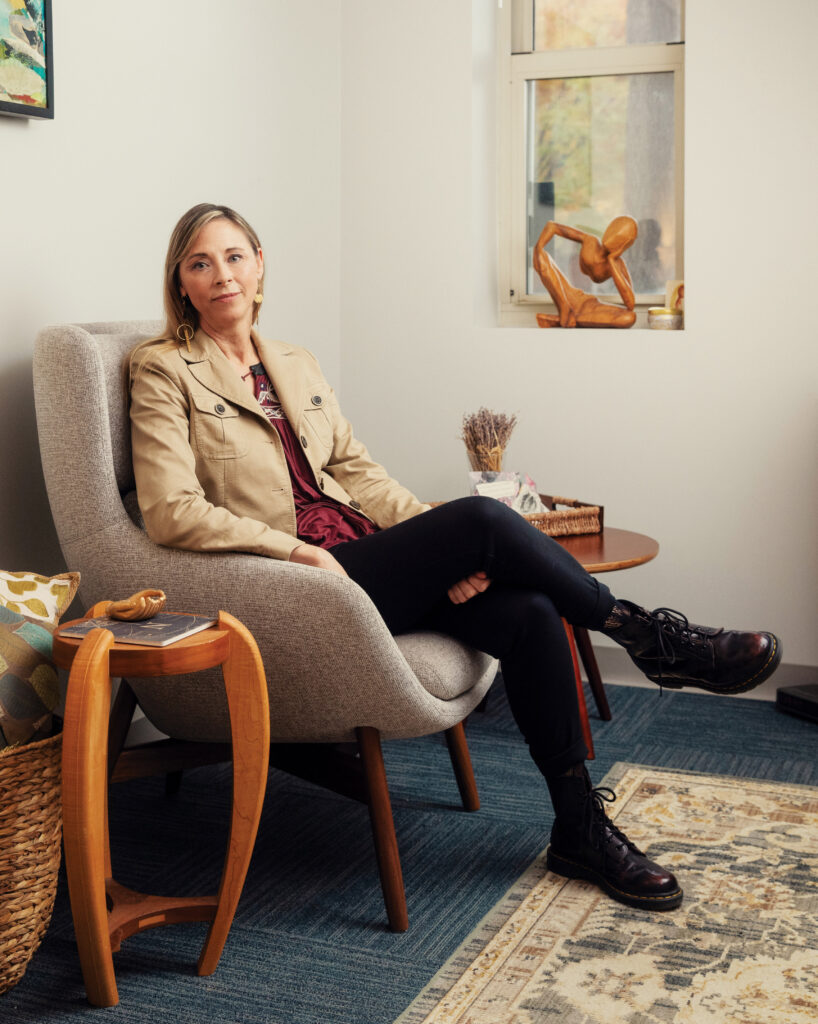
Susan E. Ellingwood, LICSW
Clinical Counselor/Substance Use Counselor
Assistant Director Of Substance Use Services
She was named Clinical Social Worker of the Year in 2019 by the Rhode Island National Association of Clinical Social Workers for her work in treating addictions.
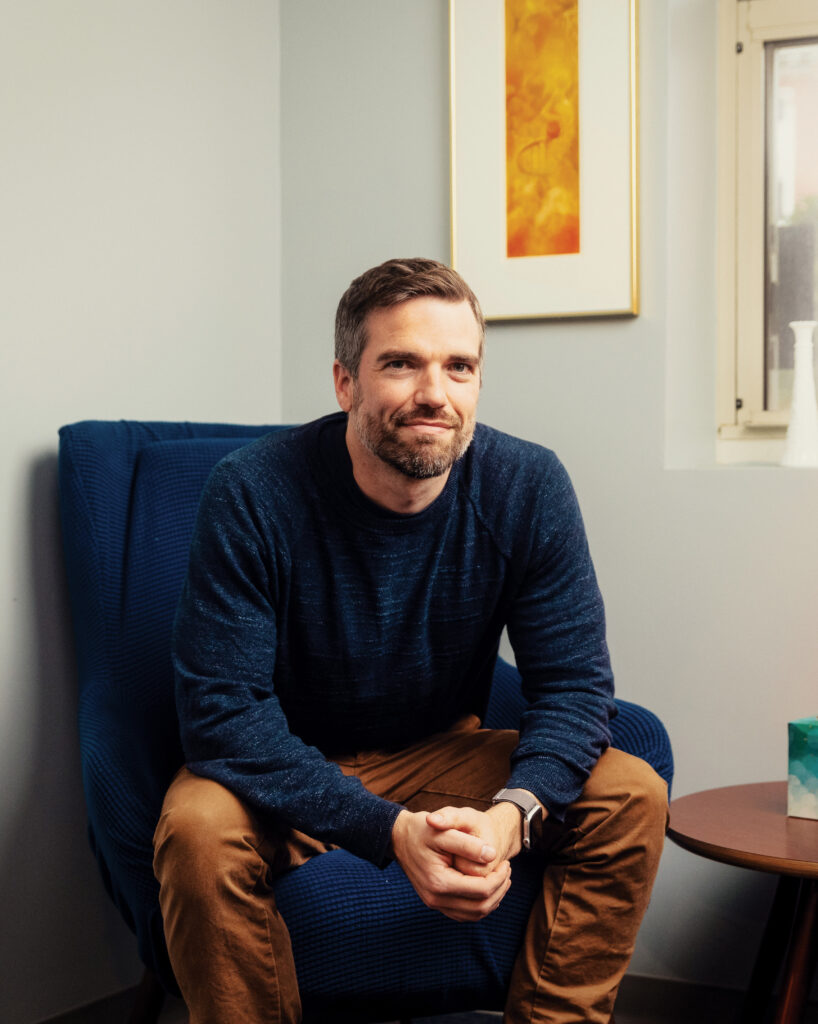
Peter Gray, LICSW
Clinical Counselor/Substance Use Counselor
Before becoming a clinical social worker, he was a chocolate maker and children’s rock band artist.
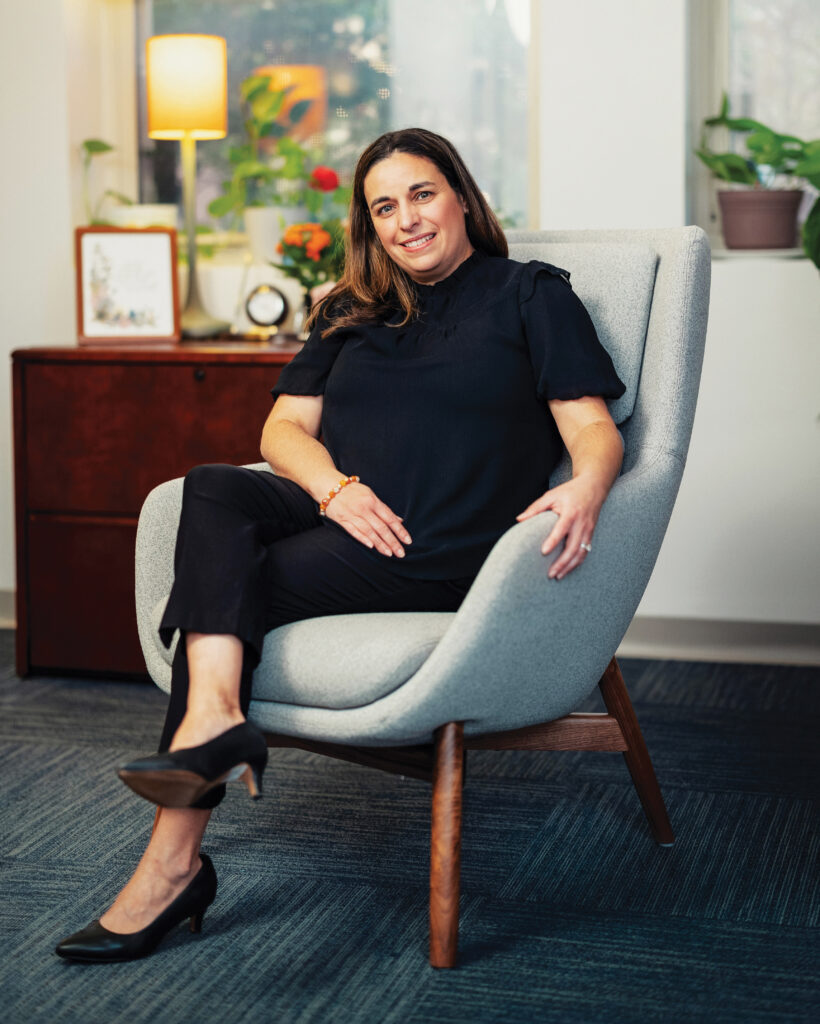
Rosemary Fernandes Mugan, PSY.D. ’98
Executive Director
Staff Psychologist
Thanks to a program she created, 26 graduate students from area colleges and universities studying clinical psychology and social work have trained in the Personal Counseling Center.
“The relationship between student and therapist is the biggest predictor for successful treatment or a student meeting their goals for therapy success,” Mugan said. “Our planning for treatment is very individualized. I think it’s why we’re so effective in helping people get well.”
Inspired by the care and guidance she received as an undergraduate, Mugan brings a profound sense of purpose to her role. The Personal Counseling Center was a vital resource in the support network that helped her adjust and excel as a firstgeneration college student and psychology major in the Honors Program.
Mugan grew up as an only child in New Bedford, Massachusetts. Her father was forced to leave work due to a debilitating inflammatory disease that left him bedridden, and her mother, a native of Madeira, left her job as a seamstress in a curtain factory to care for him. Mugan’s acceptance to PC came with a financial aid package that, while substantial, would still drain the family’s savings. Nevertheless, at her mother’s insistence, Mugan called to say thank you.
Mugan spoke with Brother Kevin O’Connell, O.P., associate director of financial aid, telling him that she would work hard in her studies to be considered for more scholarship assistance in the future. Brother Kevin asked questions about her family circumstances. About a week later, Mugan received another letter from PC, this time saying she had been awarded a scholarship covering full tuition, room, and board for four years.
“This was the first time I experienced the heart of the mission of Providence College, and its commitment to educating first-generation students and students from underprivileged backgrounds,” Mugan said.
Enthralled by college life and her academic studies, Mugan was still burdened by the fear that she would somehow “mess up this opportunity.” Peculiarities of higher education sometimes made her feel like an outsider (“Why were there so many people named Dean?” she remembers thinking.) She sought guidance from the Personal Counseling Center and began meeting regularly with counselor Ann Bellotti, LICSW, during her first year as a student.
Mugan also was supported by the college as her family circumstances changed. Her father died her senior year at about the same time her mother began showing signs of Alzheimer’s disease. Rev. Joseph Guido, O.P., now assistant professor of psychology and senior staff psychologist in the Personal Counseling Center, became her academic mentor. He encouraged her to take a year away from her studies after graduation, though she had been planning to study for a master’s degree in social work. Instead, she applied to doctoral programs in psychology.
When she graduated in 2006 with a doctor of psychology degree from the University of Hartford, she was hired by PC as a clinical counselor. She was named interim director in 2015, director in 2016, and executive director in 2023.

Mugan has overseen the center’s expansion, and with help from the staff, has continued to build partnerships across campus, taking part in orientation for new students and their parents, and meeting with first-generation and multicultural students. She and her staff have been invited to speak in classrooms and to provide training to employees.
The center plays an important role in supporting student safety. Susan Ellingwood, MSW, LICSW, clinical counselor and director of substance use services, is one of two clinicians with a specialization in substance use concerns, able to assist students who seek help for themselves or are referred by a friend or family member. PC’s Office of Community Standards also refers students for assessment after behavioral, drug, and alcohol infractions.
“In these cases, it’s often a student’s first experience seeing anyone for their mental health, and we want to make it a positive and educational experience,” Ellingwood said. “We want students to walk away confident that they can use harm reduction skills and know how to stay safe in high drinking
environments.”
Through education and outreach, the college has seen the number of students transported to hospitals for alcohol intoxication decline since 2010. That decline has been offset by an increase in students seeking help reducing their marijuana use, especially after Rhode Island and Massachusetts legalized the use of recreational cannabis for those over 21, Ellingwood said.
“There’s a sense of invincibility around marijuana, similar to alcohol, that shouldn’t exist at all,” Ellingwood said. “It affects each person uniquely, and individuals find that it can significantly worsen their mood or anxiety. For many reasons, some students become dependent on marijuana, alcohol, or other substances, and we welcome the chance to work with them to support their personal goals of cutting
back or abstaining.”
The Personal Counseling Center also has seen an increase in anxiety, obsessive compulsive symptoms, and body image concerns among students — trends they believe the pandemic accelerated. Today’s PC students were in high school during the shutdown. Isolation disrupted social-emotional development. The prevalence and pressures of social media also contribute to insecurity.
“The pandemic created separation, and where there’s separation, there will be fears related to reacclimating,” Mugan said. “Our students endured two years of remote learning in high school against the backdrop of social and political crises. When they ask, ‘What’s next?,’ they are faced with economic and climate uncertainty.”
A survey of the Class of 2020 showed that about 47% received services through the Personal Counseling
Center at some point in their time at PC. Ellingwood said she believes the college is providing appropriate, maximum access to mental health support.
“Not everyone needs professional mental health services,” Ellingwood said. “A lot of students have strong support networks at home and at the college that positively impact mental health. There are so many
ways our students feel held.”
Mugan would love to increase the part-time hours of the staff psychiatrist to full time, and to be able to accommodate every student request for a weekly appointment. Counselors now see about six students per day and have brief windows between appointments to coordinate care and outreach.
“We bear witness to things we may not be able to change for students, things that perhaps they are unable to change themselves,” Mugan said. “But we can help them navigate those situations and provide insight on ways to cope with them. We can help students contemplate things they might not otherwise consider and recognize possibilities they might not otherwise have opportunity to see. Counseling is an opportunity to discover.”
The reward is watching students cross the stage at commencement.
“We are so honored to work with students in times when they’re so vulnerable. We are privileged to work with so many campus partners equally committed to our students. That’s the beauty of working at Providence College. There are helpers everywhere,” Mugan said.
The Fund for Providence College is instrumental in providing the resources the Personal Counseling Center needs to support students. Make your gift through The Fund for Providence College – Area of Greatest Need and let PC students know that they are never alone in Friartown.





